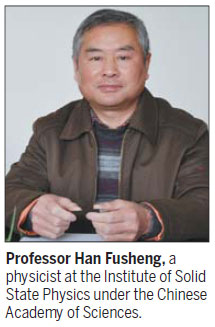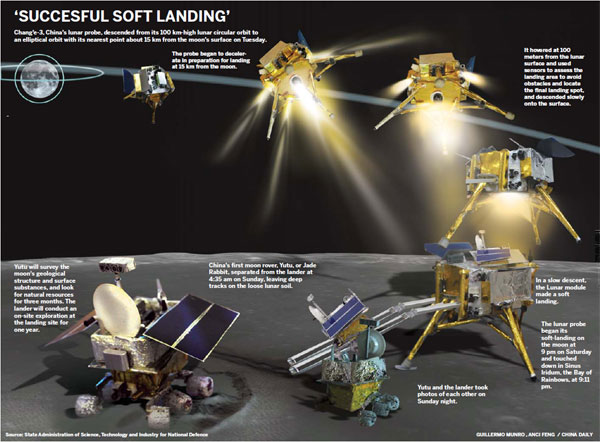|

'Years of hard work have been repaid'
Scientists were thrilled at the successful landing of the Chang'e-3 lunar probe on Saturday, which makes China the third nation to carry out a lunar soft landing after the United States and the former Soviet Union.
"I was very excited after hearing about the successful soft landing as our years of hard work have finally been repaid in the best way," Han Fusheng, a scientist involved in the landing project, said in an exclusive interview with China Daily.
As scheduled, the probe fell from an altitude of 3 meters above the moon surface with the engine shut down. The free fall required a cushioning system to protect the 3.8-metric-ton craft from being damaged.
Thanks to the research of Han's team, the lander was equipped with interior buffer materials to provide flexibility and shock-absorbing capabilities, making the safe landing possible.
Han, a professor and physicist at the Institute of Solid State Physics under the Chinese Academy of Sciences, has spent more than five years researching new highly efficient impact-energy absorption materials and products for the Chang'e-3 mission, in which it landed on the moon's Sinus Iridum, or the Bay of Rainbows, at 9:11 pm on Saturday.
The institute, based in Hefei, Anhui province, is well-known for its fundamental research on condensed matter physics and materials science.
"As China has never touched down on any planets beyond Earth before, we had to start our work from scratch, which turned out to be a painstaking process," said Qin Yong, Party chief of the institute.
Han added: "This is the first time we have participated in this kind of spaceflight project. We experienced failures in the process, but we finally solved the problems after prudent investigations."
The authorities required researchers to record every experiment in detail, which proved to be very useful in identifying problems when failures occurred, Han said.
Professor Ye Hong at the University of Science and Technology of China said, "Mistakes in small details are what I worry about most in our research, while failures are almost inevitable, and lessons learned from them could be very useful in the future."
Ye participated in the preliminary research of the lander's ther

mal control system.
The moon is located about 380,000 km away from Earth, and signal receiving and processing has played a key role in connecting the moon lander with scientists back on Earth.
The research on the high-sensitivity signal receiving system made Wang Shengwang, an expert in Hefei, and his colleagues "extremely proud".
"From a distance of as far as 380,000 km, signals sent back to Earth from the probe can be rather weak, which puts stricter requirements on our high-sensitivity signal receiving system. Our experience drawn from the previous Chang'e-1 and Chang'e-2 projects and improving technologies made us more confident this time," said Wang.
"Our research specifically conducted on the Chang'e-3 projects lasted more than three years and required a large team of more than 60 members," Wang added.
Pictures of the moon surface taken by cameras loaded on the lander were sent back to Earth, showing that the institute's work has been successful so far, Wang said.
Wang said his work for the mission will continue, as the Yutu (Jade Rabbit) moon rover released from the probe will work on the moon for at least three months.
Tasks for Yutu include surveying the moon's geological structures and surface structures, while looking for natural resources.
Both Han and Wang said research on the moon probe missions will continue.
"As the initial participation in such a project turned out to be a success, we will carry out research and consolidate our advantages in materials science to better serve the nation's future spaceflight projects, which will be a great honor for us," Han said.
Contact the writer at machenguang@chinadaily.com.cn

|